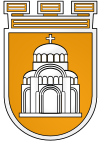Pleven
| Pleven (Плевен) | |||
|
|||
| Basic data | |||
|---|---|---|---|
| State : |
|
||
| Residents : | 98,467 (December 31, 2016) | ||
| Coordinates : | 43 ° 25 ' N , 24 ° 37' E | ||
| Height : | 116 m | ||
| Postal code : | 5800 | ||
| Telephone code : | (+359) 064 | ||
| administration | |||
| Mayor : | Najden Zelenogorski | ||
Plewen [ ˈplɛvɛn ] ( Bulgarian Плевен ) is a town in Bulgaria in the valley of the Tutscheniza river, with almost 100,000 inhabitants (as of 2016) the seventh largest in the country, the traffic center of Northern Bulgaria in the middle of an agricultural area and an industrial city. In addition, Pleven is a cultural center with a university, scientific institutes, theater, philharmonic and opera.
Pleven houses the Pleven Medical University . The city is also the namesake for the Pleven Saddle on Livingston Island in Antarctica.
location
The city is located 160 km from the capital Sofia and 320 km from the Black Sea , and is 30 km south of the Danube . Neighboring towns are Dolni Dabnik , Lovetsch , Mesdra , Slatiza , Trojan , Gabrowo , Gorna Orjachowiza , Levski , Swishtow , Zimnicea , Nikopol , Turnu Măgurele , Corabia .
history
Pleven is first mentioned as a fortress in a historical document in 1266. Excavations in Kajlâka , two kilometers to the south, show that people lived here in primitive society. In the 1st century AD the Romans fortified the place and named it Storgosia ; from the Slavs he received the name Kamenec (the stone). The name Pleven comes from the 13th century. Under the Ottomans , Pleven was a strong fortress and garrison town that developed into an important administrative, commercial and handicraft center.
The city gained historical importance through the siege of Pleven in connection with the liberation of Bulgaria from the rule of the Ottoman Empire . The bitterest battles of the Russo-Ottoman War of 1877–1878 raged in Pleven , later described in a heroic poem (Epopee of Pleven). The first Russian attacks took place on July 20 and 30, 1877, at which time the Turks had not yet built any fortifications, but they were repulsed by the Turkish defenders with great losses. In the Third Battle (on September 11th) the Russians were able to break into the Turkish defense at short notice but had to stop the attacks due to high losses and go over to siege. Russian and Romanian troops had besieged the fortress for almost six months; this siege is considered to be the central event of the Russo-Turkish war of 1877/78. After five months of siege, the 43,000-strong Turkish army of Nuri Pascha Osman had to surrender to the Russian army at Pleven on December 10, 1877 . In the Bulgarian national consciousness, the battle at the Shipka Pass is anchored even more deeply, but militarily it is by orders of magnitude less important than the battle for Pleven.
media
In the vicinity of Plewen there was an important radio transmission system for short and medium wave. The medium wave transmitter Pleven used two 250 meter high tubular steel masts, each 250 meters high, insulated from the ground, which were among the tallest structures in Bulgaria. In April 2010 the transmitter was switched off.
Twin cities
-
 Gornji Milanovac , Serbia
Gornji Milanovac , Serbia
-
 Kaiserslautern , Germany , since 1999
Kaiserslautern , Germany , since 1999 -
 Rostov on Don , Russia
Rostov on Don , Russia
-
 Bursa , Turkey
Bursa , Turkey
-
 Yongchuan District, Chongqing City , People's Republic of China , since 2012
Yongchuan District, Chongqing City , People's Republic of China , since 2012
Personalities
- Ivan Vinarow (1896–1969), Lieutenant General
- Vladimir Trandafilow (1897–1972), actor and director
- Bogomil Nikolov (* 1943), university teacher, medalist and painter
- Alexander Litschev (* 1946), historian and university lecturer
- Swilen Rusinow (* 1964), amateur boxer
- Swetla Wassilewa (* 1964), publicist
- Antonina Setova (* 1973), volleyball player
- Lucy Diakovska (* 1976), pop and musical singer
- Teresa Marinowa (* 1977), track and field athlete
- Julija Stojanowa (* 1985), volleyball player
- Tichomir Ivanov (* 1994), athlete
Web links
- Official website of the city of Pleven (Bulgarian)
- Frank Stier: Pleven. Alpen-Adria University of Klagenfurt
- Pleven. bulgariatravel.org
Individual evidence
- ^ NSI - National Statistical Institute
- ↑ History Plewens
- ↑ The Battle of Pleven. Radio Bulgaria, December 13, 2007 ( Memento of January 21, 2008 in the Internet Archive ).
- ↑ Entry on predavatel.com (Bulgarian)
- ^ Chongqing Municipal Government



